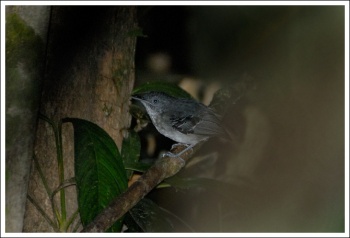(Picture caption amended to correct overwritten image upload. Imp sizes. References updated) |
m (Editor note) |
||
| Line 1: | Line 1: | ||
| − | [[Image:Black-chinned_Antbird.jpg|thumb|550px|right|Subspecies ''melanopogon''<br />Photo by {{user|andyadcock|andyadcock}}<br />Vuelta Larga, [[Venezuela]], January 2016]] | + | [[Image:Black-chinned_Antbird.jpg|thumb|550px|right|Subspecies ''melanopogon''<br />Photo by {{user|andyadcock|andyadcock}}<br />Vuelta Larga, [[Venezuela]], January 2016 <!--EDITORS: this image does not appear in the Gallery-->]] |
;[[:Category:Hypocnemoides|Hypocnemoides]] melanopogon | ;[[:Category:Hypocnemoides|Hypocnemoides]] melanopogon | ||
==Identification== | ==Identification== | ||
Revision as of 01:34, 19 March 2018
- Hypocnemoides melanopogon
Identification
11–12 cm (4¼-4¾ in)
- 2-3 white wing-bars
- Narrow white tail-tips
- Pale blue iris
Male: black throat patch
Female: a grey scaly throat
Similar Species
This species is mostly found north of the Amazon while the very similar and closely related Band-tailed Antbird is found south of the Amazon.
Distribution
South America: found in Colombia, Guyana, Suriname, French Guiana, Ecuador, Peru, Brazil
Taxonomy
Subspecies
There are 2 subspecies[1]:
- H. m. melanopogon:
- H. m. minor: smaller than the nominate race
- South-central Amazonian Brazil
A third subspecies occidentalis, is not recognised by all authorities[1]
Habitat
Swamps.
Behaviour
It is always found near water, hopping on logs or in low shrubs.
References
- Clements, J. F., T. S. Schulenberg, M. J. Iliff, D. Roberson, T. A. Fredericks, B. L. Sullivan, and C. L. Wood. 2017. The eBird/Clements checklist of birds of the world: v2017, with updates to August 2017. Downloaded from http://www.birds.cornell.edu/clementschecklist/download/
- Avibase
- Arthur Grosset
- Wikipedia
Recommended Citation
- BirdForum Opus contributors. (2024) Black-chinned Antbird. In: BirdForum, the forum for wild birds and birding. Retrieved 24 April 2024 from https://www.birdforum.net/opus/Black-chinned_Antbird





